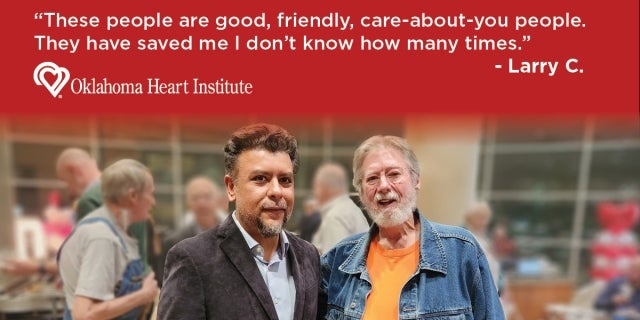Larry Cave would tell you he’s been living on borrowed time since he was 16, when a brain surgeon saved his life after a car crash. With the help of medical providers over the years, Cave has survived a cancer diagnosis, a heart attack and multiple surgeries. In the last decade, Cave has been part of a milestone of innovation at the Oklahoma Heart Institute that saved his life again.
Cave received radiation treatment for lymphoma when he was just 24 years old. The treatment damaged his heart. Cave had a heart attack in 1998, and then bypass surgery six years later. He had pacemakers installed, and in 2012, his cardiologist noticed Cave’s aortic valve was stenosing, or narrowing.
“Things had been radiated, so instead of opening nice and easy, it's not really getting closed. It’s just tough like beef jerky,” said Cave. “So, they said ‘You’re going to have to have an aortic valve replacement, but you can’t stand the open-heart surgery.’”
Kamran Muhammad, M.D., is the director of the Structural Heart Disease Program at Oklahoma Heart Institute (OHI). He performed the first transcatheter aortic valve replacement (TAVR) in Tulsa and the area. This minimally invasive approach reduces the risk of surgical complications and allows patients to recover more quickly and go home sooner than traditional surgeries.
“Before TAVR, the only way to get your aortic valve replaced was to have open-heart surgery. It’s a very invasive operation, so there’s a lot of pain and discomfort and shortness of breath,” said Dr. Muhammad. “With trans-catheter therapies where we can repair or replace valves through catheters, that avoids all of that. The pain, the shortness of breath, the stress, the incision, the weakness, the tiredness, the ICU stay, the six-day hospital stay, and people get full advantage of the valve that we repaired or replaced right away.”
When he got the operation to fix his aortic valve in 2013, Cave was Dr. Muhammad’s 29th TAVR patient. Cave was at high risk for surgery to replace his aortic valve given his history of chest radiation and previous heart surgery. Dr. Muhammad and his team made Cave feel safe and comfortable with the procedure.
“The man is technically brilliant, and he’s a friendly man. Going into the operating room with him is like a parade,” said Cave. “It was a great atmosphere.”
Cave currently receives treatment at the OHI Advanced Heart Failure Center, located on the campus of Hillcrest Medical Center, and is also working through another lymphoma diagnosis. He says he’s giving it all he’s got.
“I am living on borrowed time. You ever go to a casino, and you win? And you kinda get to thinking, ‘I’m playing on their money, I’m playing on house money.’ That’s the way I feel about my life,” said Cave. “I think I got house money on those surgeries, and I’ve been living on it ever since. Whatever happens with this, I’ve had a good life.”
OHI recently celebrated its 1,000th TAVR procedure, completed by Dr. Muhammad.
“It’s great, I think it’s a win for the patients here in northeast Oklahoma and the surrounding communities,” said Dr. Muhammad. “It was a real celebration of the patients. It’s a big milestone, not many hospitals can say that.”
Cave spoke at a special event held to celebrate the 1,000th TAVR. He said he would recommend the experienced professionals at OHI to any patient going through what he has.
“These people are good, friendly, care-about-you people. They have saved my butt I don’t know how many times,” said Cave. “If you’re having trouble right now, they’ll take you right now. These people will take good care of you.”
To learn more about TAVR and the other treatments OHI offers, click here.

